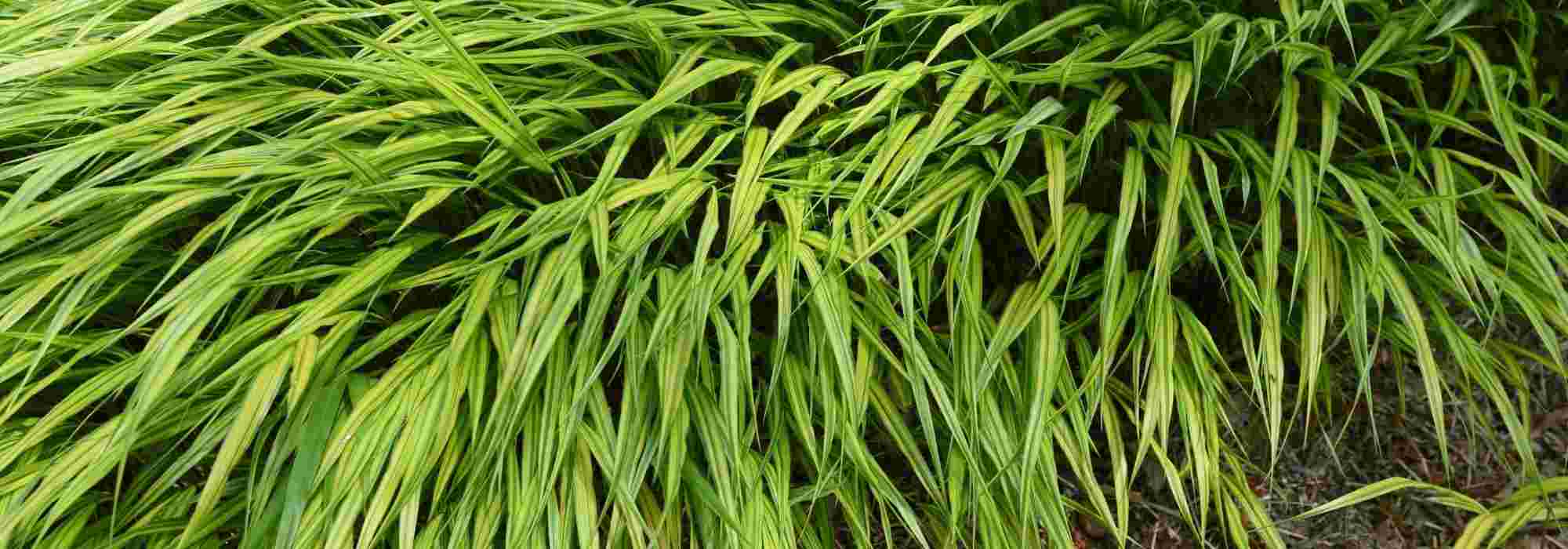
Hakonechloa: the most beautiful varieties
The most beautiful Japanese forest grass to install in the garden or in pots
Contents
Hakonechloa, or Japanese forest grasses, are lovely grasses, grown for the beauty of their foliage. Available in solid colours or adorned with fine variegations, this perennial forms a dome whose elegant habit is reminiscent of a waterfall. Slow-growing, Hakonechloa gradually spreads to create beautiful groundcover. Preferring woodland settings, it requires neutral to acidic soil, some moisture during the season, and prefers to be sheltered from overly hot exposures. In winter, its straw-coloured foliage continues to enliven the garden, after autumn has painted it in shades of gold, red, purple, or bronze. Discover this selection of 6 particularly decorative varieties to help you make your choice.
Hakonechloa ‘All Gold’, a golden foliage
Hakonechloa macra ‘All Gold’ lives up to its name. This variety forms a dome of leaves in the most golden hues of the genus, reaching 40 cm in height with a similar spread. It is a particularly bright Japanese Herb, best placed in a spot where it receives some sunlight during the day, which enhances the beautiful colour of its foliage. Too much shade will cause it to green, while excessive direct sunlight can scorch it. Its colour pairs well with the bluish tones of an Hosta ‘Halcyon’, Actaea ‘Misty Blue’, and the grey and silver tones of a painted fern, a Caucasian Myosotis, such as ‘Looking Glass’, or a Bleeding Heart ‘Burning Hearts’.
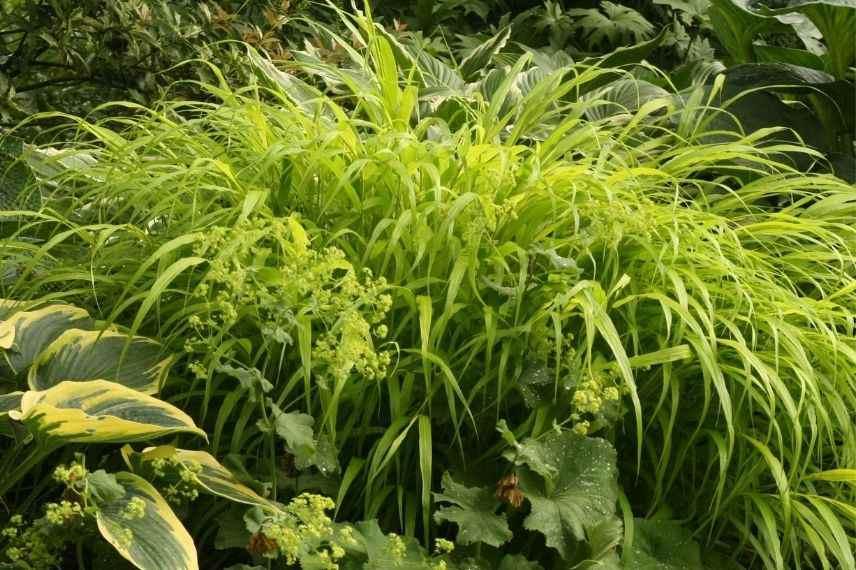
Hakonechloa macra ‘All Gold’
Hakonechloa ‘Aureola’, the elegant variegated grass
The variegated foliage of Hakonechloa macra ‘Aureola’ is undoubtedly the most elegant of the genus. The leaves of a soft yellow are streaked along their length with green stripes of varying thickness. This creates an optical effect that makes the foliage appear even finer and enhances the cascading habit of this beautiful cultivar, which is about 30 cm in all directions. Placed in partial shade, the rays of sunlight, filtered through the light foliage of the upper layer, intensify this relief and transform this grass into a cascade of charming shadows and light. This woodland atmosphere is very easy to establish by adding a few Hostas, Ferns, vibrant or pastel flowering Astilbes with plume-like blooms, or even a variegated Daphne, whose evergreen foliage is adorned with highly fragrant flowers in winter.
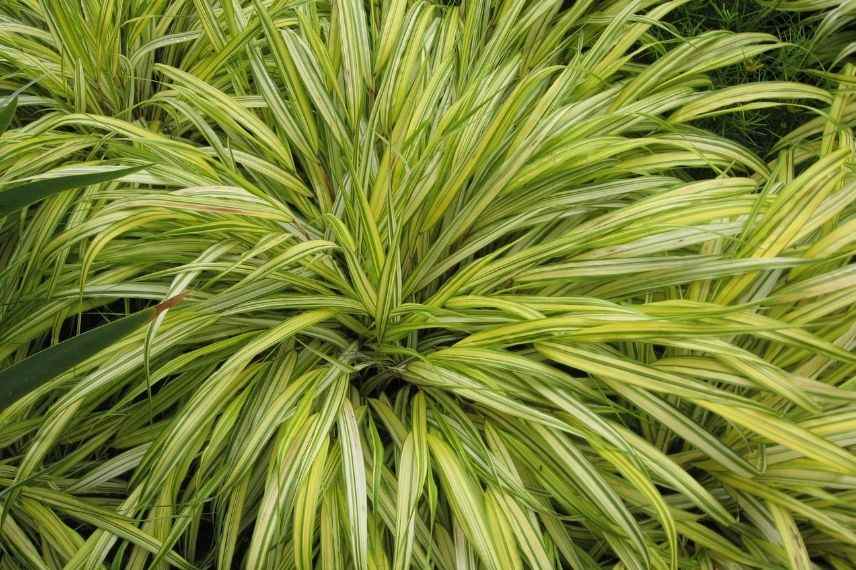
Hakonechloa macra ‘Aureola’ (photo Wikipedia)
Discover other Hakonechloa
View all →Available in 0 sizes
Available in 2 sizes
Available in 2 sizes
Available in 1 sizes
Available in 1 sizes
Available in 2 sizes
Available in 2 sizes
Available in 2 sizes
Available in 2 sizes
Available in 2 sizes
Hakonechloa type, understated and generous
The type species, Hakonechloa macra, offers a uniform green leaf, particularly easy to combine. Moreover, this species is generally a bit more vigorous than others, and sometimes grows faster, forming a regular dome with a soft and understated habit, measuring 40 to 50 cm in all directions. In autumn, the foliage turns a yellow-orange hue, adding to its charm and making it stand out even more. Its beautiful green pairs well with everything! Ideal for creating opulent scenes, for example by contrasting the delicacy of its linear leaves with the palmate foliage of a False Aralia, or alongside the thick, heart-shaped leaves of a Hosta. By opting for Heucheras, you can create vibrant tapestries, embroidered or highlighted by the Hakonechloa.
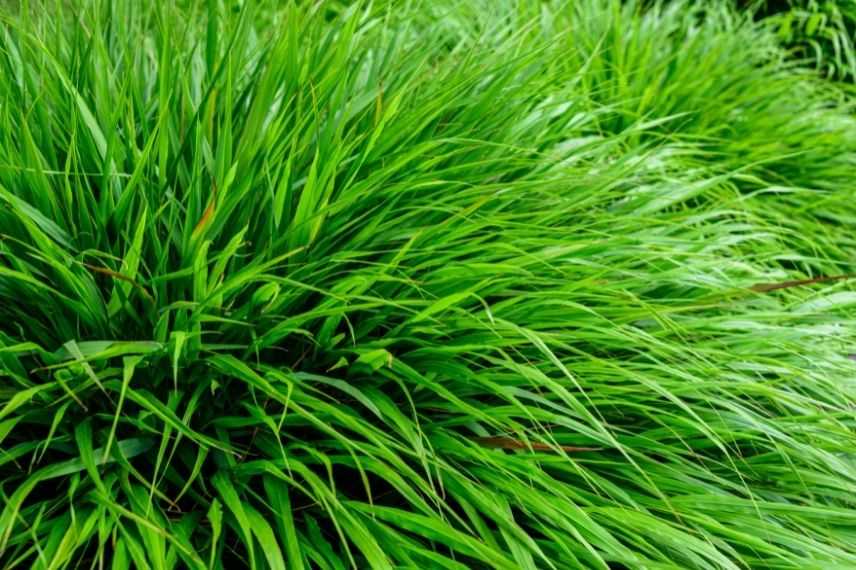
Hakonechloa macra
Hakonechloa ‘Nicolas’, the autumn flames
All Japanese herbs change hue as autumn approaches, but it is undoubtedly Hakonechloa macra ‘Nicolas’ that offers the warmest colours. Its foliage, green in season, gradually blends yellow, bronze, and orange, from the lightest to the most burnt, creating a display that is hard to ignore. With great vigour, this variety is ideal for complementing late-season scenes, alongside plants whose foliage also ignites at this time. It can thus form an elegant skirt of beautiful hues at the base of bushes such as Cotinus, Chinese Azaleas, or a Winged Spindle, which provide it with shade during the season, then harmonise their red to orange foliage with that of Hakonechloa. Of course, paired with a Japanese Maple with foliage worthy of lace embroidery, you cannot go wrong.
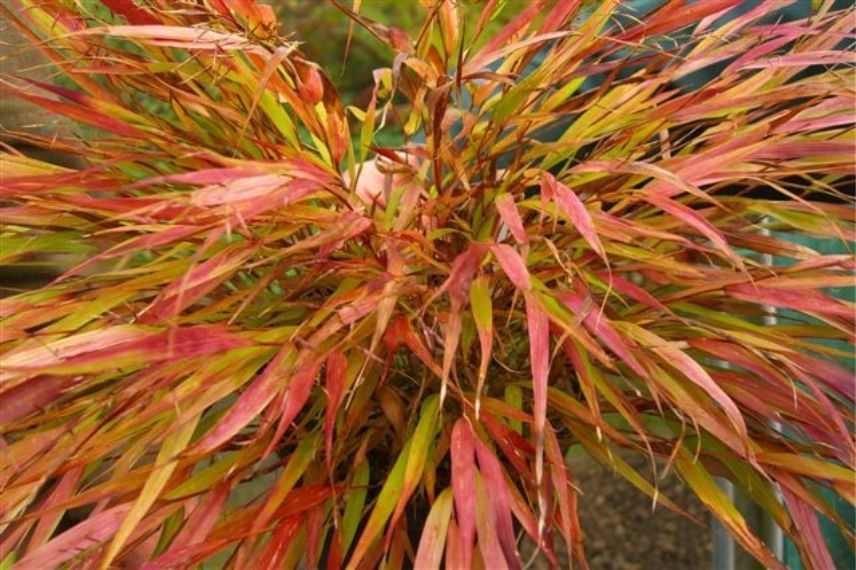
Hakonechloa macra ‘Nicolas’
Hakonechloa ‘Albostriata’, graphic and contemporary
Hakonechloa are well-suited for creating contemporary scenes, based on the graphic nature of the plants, their textures, and the colour of their foliage. With Hakonechloa macra ‘Albostriata’, the foliage forms a fountain with a languid habit, where green and cream white blend in longitudinal bands. These two neutral shades create a clean ensemble, which pairs wonderfully with other plants known for their graphic appeal. Thus, this grass, planted in groups, can adorn the base of a Himalayan Birch, creating a connection with the white of its bark. Accompanied by Ophiopogon ‘Nigrescens’, it allows for the formation of groundcover carpets with a distinctly clean look. It can also serve to highlight perennials such as Japanese Anemones, either by accentuating the theme of white with ‘Honorine Jobert’, or to temper the more vibrant colours of a variety like ‘Splendens’.
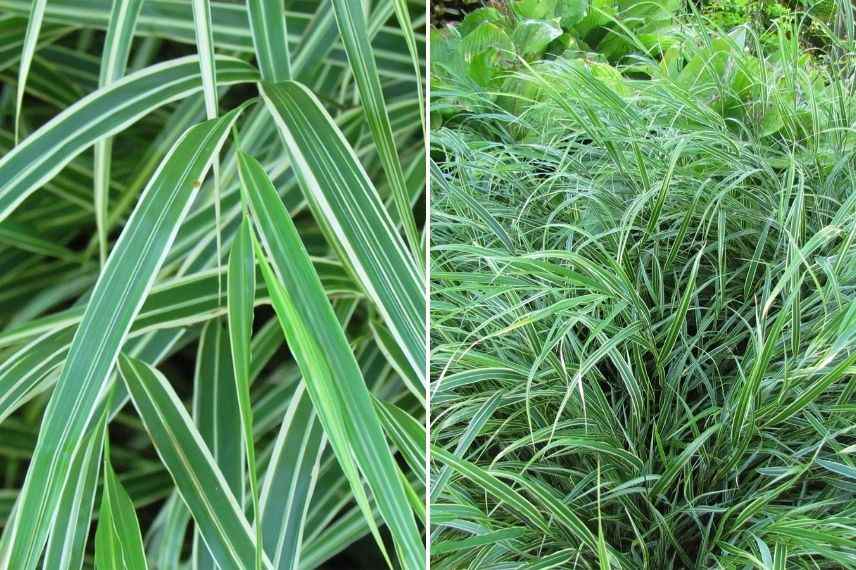
Hakonechloa macra ‘Albostriata’
Hakonechloa ‘Sunflare’, even on the balcony
Hakonechloas grow very well in pots, allowing them to be admired on a terrace or balcony, as long as they enjoy a cool and somewhat shaded atmosphere. While all varieties are suitable for this use, Hakonechloa macra ‘Sunflare’ promises beautiful colours that will evolve throughout the season. Initially yellow with green highlights, its leaves gradually take on shades of purple, red, and orange as autumn approaches, in various hues. With its trailing foliage, it creates a soft scene. Instead of growing it alone, place its pot in the foreground of taller containers, where beautiful bushes like Pieris, Azaleas, Hydrangeas, or Camellias can thrive.
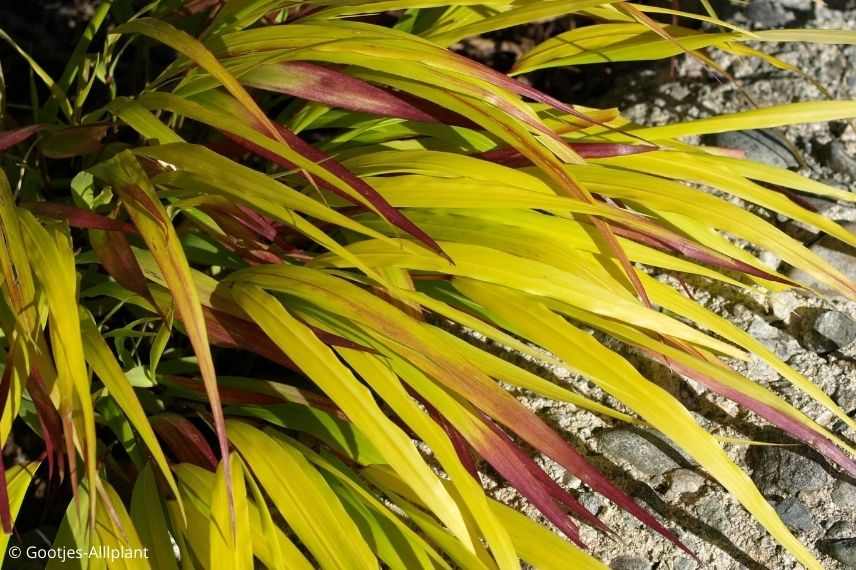
Hakonechloa macra ‘Sunflare’
- Subscribe!
- Contents
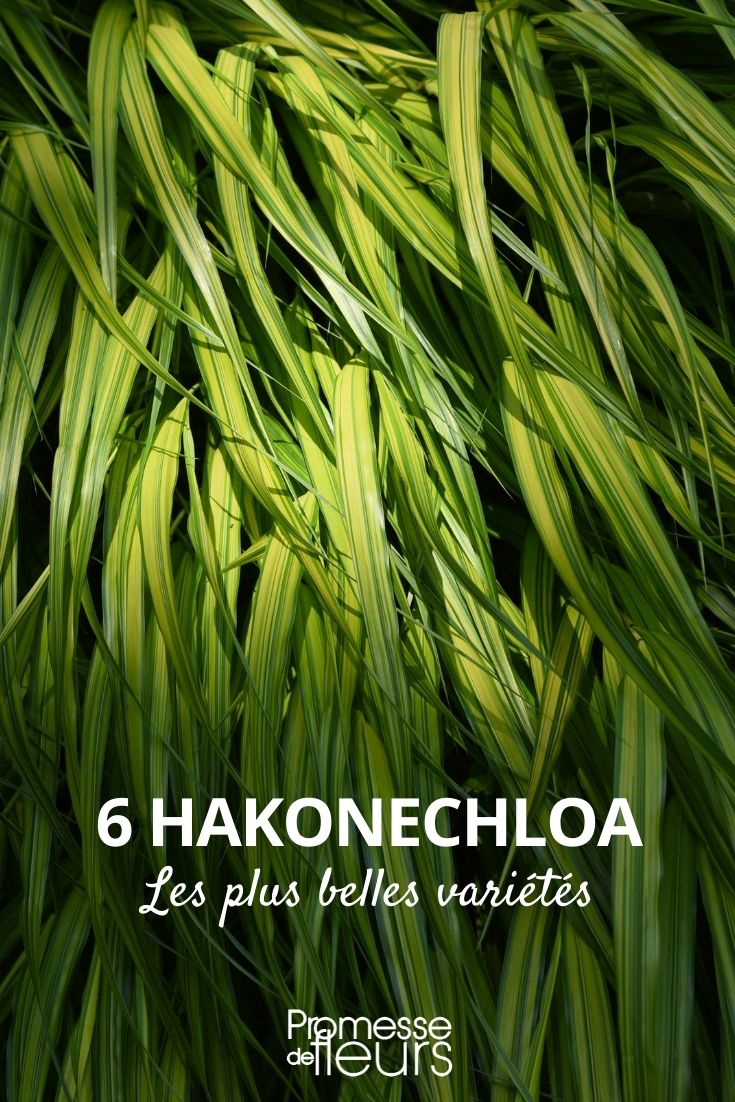































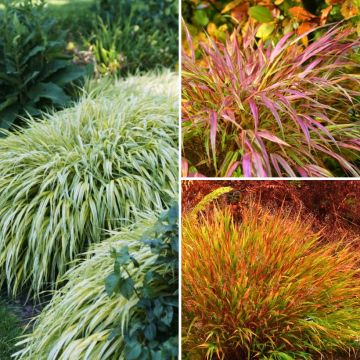
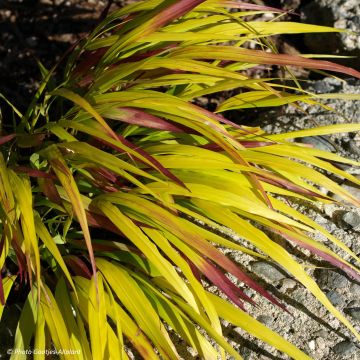
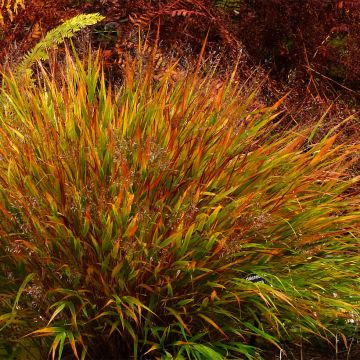
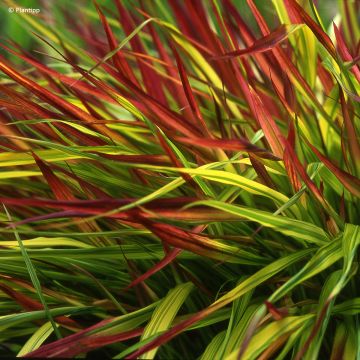
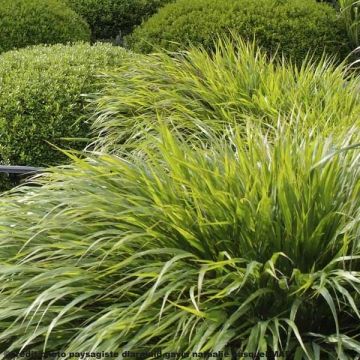
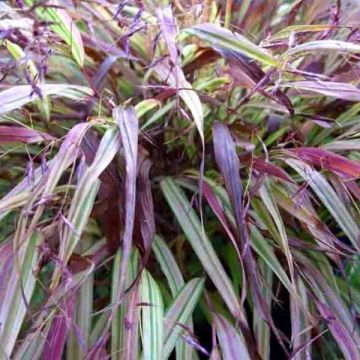
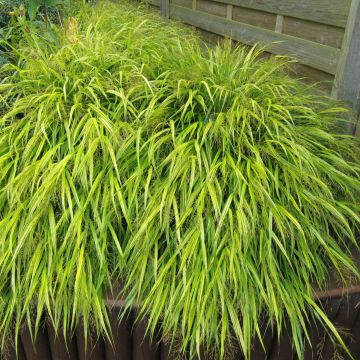
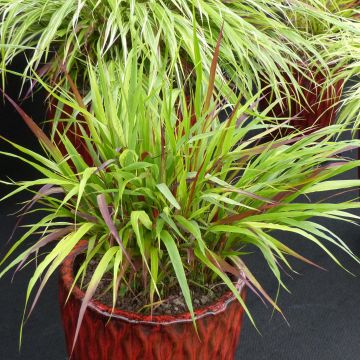
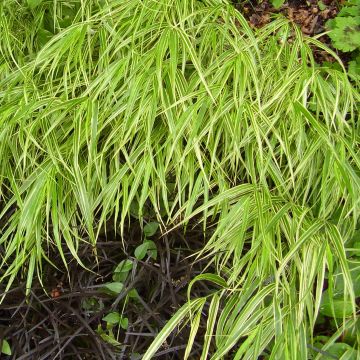
Comments